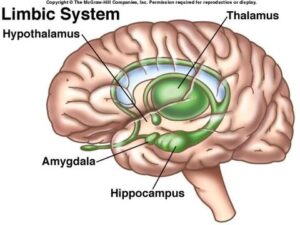BEHAVIOUR AND EMOTION’s CONTROL ROOM: THE LIMBIC SYSTEM
Dr. MAMTA SAINI1 and Dr. VIKASH SAINI2
1 (Teaching Associate, Department of Veterinary Biochemistry, College of Veterinary and Animal Science, Bikaner)
2(Calf Rearing In-charge, Sahiwal Progeny Testing Project, Suratgarh)
In our daily life; every minute; every second many conscious and unconscious incidents happening; example sleeping and waking pattern, learning, memory (long term & short term memory), regulate body temperature in summer and winter; also indoor and outdoor, food craving, loving behavior, maternal behavior, motion sickness, etc. Do you think about it, what happen in our body or brain. In our body a limbic system works in some manner by which mind responds and experience physiological and psychological behavior. For the example, suppose you are in a trouble in this case activates flight and fight response, which is triggering a physical response to emotions such as fear. Limbic system prepares our body how to handle this situation.
Like human beings, domestic animals have also a well develop limbic system.
Dogs are overt in their emotional responses, such as feeling joy when saw their owner, fear in response to threats, and even signs of guilt when they’ve done something wrong, remember commands and learned behaviours.
In cattle, limbic system influences their social behaviour, regulate their herding instincts, reaction to threats and responses to environmental stimuli and stress.
Horses have emotional sensitivity to their riders and also strong bonding with other horses. These activities influenced by the limbic system.
Pigs have complex social behaviours and can form strong bonds with other pigs.
Birds like parrot have strong emotions and strong bond with their owners.
Limbic system is a structural collection of brain structures like hypothalamus, amygdala, hippocampus, cingulate gyrus, thalamus, etc. Limbic system involve in regulation of behavioral and emotional processes. Limbic system is not well developed in avian species.

Amygdala regulate emotions particularly in fear and aggression. It receives sensory information from various senses like sight, sound and smell and prepare the body for fight or flight reaction. Damage of amygdala can cause poor emotional behavior and aggression behavior or more risk taking behavior.
Hippocampus form new memories particularly declarative memories that involve facts and events. It is also play a role in spatial navigation (the process by which organisms use multiple cue sources such as path integration, magnetic cues, landmarks, and beacons to determine the route to a goal and then travel that route.) and learning. Damage of this region can cause memory loss.
Hypothalamus maintains internal equilibrium of body and regulates various body functions like hunger, thirst, body temperature and sleep-wake cycle. It is also associated with basic emotions and drives. It is also control the body response for stress. Hypothalamus damage can cause stress, disturbances in body temperature, libido, weight and fatigue.
Thalamus acts as relay station for sensory information travelling between sensory organ and cerebral cortex. It helps direct sensory input to appropriate area of the brain for further processing and play role in emotional and memory functions. Highly damage of thalamus can cause coma. Thalamus damage can cause loss of sleep, muscle weakness, memory loss and vision loss.
Cingulate gyrus is involved in regulation of emotions, decision making, attention and empathy.
Limbic system studies help in many brain disorders which part are affected, how to cure, what precaution is to use and also help to understand the behavior and also prepare the animal adaption, emotional attachment, motivation, social behavior, in stress, homeostasis and decision making. Therefore, the limbic system also refer as “feeling and reacting brain”.



